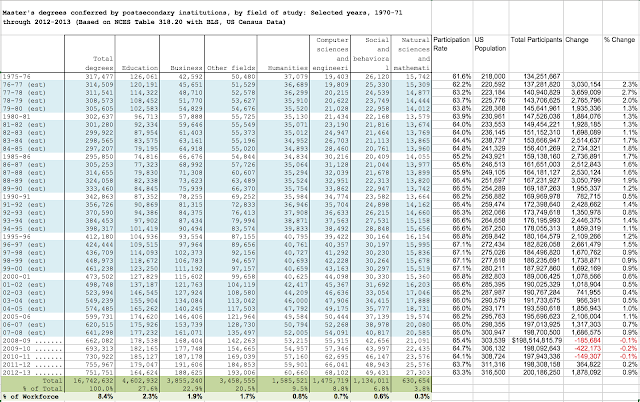Somehow I got started down this path of trying to figure out how many people have the level of educational attainment that a growing number of our friends have (and that Lisa is working toward now). Like most idle curiosities of mine, this led to an elaborate spreadsheet and a completely amateur attempt at exploratory data analysis. Fun.
 |
| Why again did I decide to spend so many weekend hours in Excel? Oh that's right, because the Minecraft server is down, and Josh has finals, so I didn't want to bother him... Don't judge... |
According to NCES Data there have been around 16.7M Masters degrees awarded in the US since 1976, and another 4.5M or so Doctoral degrees (includes medicine and law degrees among many others.) 1976 is almost 40 years ago, so assuming that most grad students don't finish before age 25 (any ideas on where to get that particular data point?), these are substantially all of the graduate degrees that are currently in the workforce (or at least around 90-95% of them, but we'll just call that all of them for the sake of getting to bed at a decent hour)(maybe).
This means that the 200M or so Americans that have a job or are looking for a job hold about 21M advanced degrees between them. The US Census says that as of 2014, 10.4% of Americans over 18 have a graduate degree, just under 25M people.
That 25M people includes the 5.1M people over 65 who are still alive and have graduate degrees, but are most likely retired from the workforce, and most likely got their degree before 1976. That makes around 21M degrees for just under 20M Americans, not all of which are in the workforce, let alone employed (I'm looking at you Mr. Had-to-get-a-PhD-in-Anthropology), but the market is certainly kinder to this 20M than it is to the 30M that don't have a HS diploma...
 |
| This well circulated BLS chart shows the harsh reality of the market's heavy preference for the educated worker bee |
That's not a great reason to go to grad school, which is not unlike a twisted sleep deprivation study where you expected to get along with your hyper-ambitious colleagues with extra credit for quantifying the age-adjusted growth rate of your tears-to-caffeine ratio. But I digress.
If after you have carefully considered the implications of your terrible life choice, you do decide to purchase some post-postsecondary education, you may be comforted to know that you will be joining a relatively small portion of Americans who share your poor judgement.
Maybe.
This impulse to tie educational outcomes to economic ones in this way (however fraught) is more and more fashionable.
 |
| Put simply, degrees from some disciplines pay more than others—although the selectivity of the institution also helps... |
There is a strong argument to be made for the merits of higher education beyond the ugly capitalist pragmatism that drives so many decisions: from the policies and strategies of large universities, to the choice of which school to attend, or which degree (or even which electives) to pursue.
It's an interesting coincidence that the most popular categories by far are Education and Business, which together make up about half of all Masters degrees in the workforce. These two seem inextricably interdependent with each other and with the whole project of civilization: the development of young minds into a meaningful and informed citizenship, and the effective management of the resources and outputs of that citizenry.
You may disagree, but to me these two partners in the evolution of society seem to have lost their balance, since someone with an MA in Education would rarely expect to make as much as one with an MBA, but I suppose that is a topic for another day.
I'll close here with some relevant writing from the early 20th century education reformer John Dewey:
“The purpose of education has always been to every one, in essence, the same—to give the young the things they need in order to develop in an orderly, sequential way into members of society. This was the purpose of the education given to a little aboriginal in the Australian bush before the coming of the white man. It was the purpose of the education of youth in the golden age of Athens. It is the purpose of education today, whether this education goes on in a one-room school in the mountains of Tennessee or in the most advanced, progressive school in a radical community. But to develop into a member of society in the Australian bush had nothing in common with developing into a member of society in ancient Greece, and still less with what is needed today. Any education is, in its forms and methods, an outgrowth of the needs of the society in which it exists.”


No comments:
Post a Comment